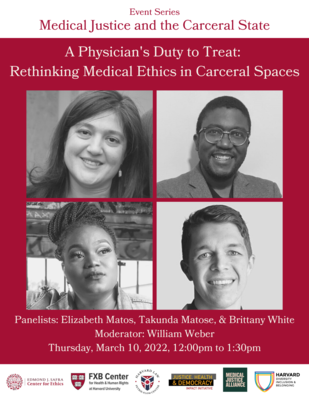Date:
Location:

Incarcerated people in the U.S. suffer disproportionately from chronic health conditions, their acute medical needs often go unmet, and the carceral healthcare system that serves them is set up to fail by a lack of resources and infrastructure. The pandemic has only magnified the health crisis that is the norm in the U.S. prison system.
Please join us for the second of the four-part event series, "Medical Justice and the Carceral State," that aims to encourage collaboration between health and legal experts, raise awareness about healthcare disenfranchisement in carceral settings, and showcase the material change that is possible through public interest law and medical partnerships.In this second panel discussion, the conversation will cover legal remedies for those experiencing health concerns in carceral settings, the need for expert medical witness testimony, and introduce the obligation that healthcare providers have to provide care beyond the bedside. The link to register for the event is below.
Panelists:
Elizabeth Matos, Executive Director of Prisoner's Legal Services of Massachusetts
Elizabeth Matos is the Executive Director of Prisoners’ Legal Services of Massachusetts and was a staff attorney with the organization for over seven years. Elizabeth has been involved in litigation about solitary confinement practices regarding prisoners with mental illness, discrimination against deaf and hard of hearing prisoners, draconian classification practices, guard on prisoner assaults, and lowering exorbitant and monopolistic prison phone rates.
Takunda Matose, Assistant Professor of Philosophy, Loyola University Chicago and 2021-22 Edmond J. Safra/Center for Bioethics Joint Fellow-in-Residence
Takunda Matose is a philosopher whose interests lie primarily at the intersection of bioethics and political philosophy. In his work on carceral justice, he defends a relational egalitarian approach to justice in health care and argue that such accounts must take social groups as legitimate units of moral concern. He was also a co-facilitator of the Reciprocal Education and Community Healing (REACH) Coalition, a philosophy group that meets on Tennessee's death row.
Brittany White, Organizing Fellow at the Institute to End Mass Incarceration and Decarceration Campaign Manager for LIVE FREE
Brittany White is a voice for formerly incarcerated Black Women. As an organizer, strategist, and trainer, she centers her work on ensuring that women and their unique experiences in the American penal system are not erased from conversations or solutions related to gun violence and mass incarceration. Brittany served five years within the Alabama Department of Corrections from 2009-2014. This eye-opening journey and loss of freedom gave her firsthand knowledge of the phenomenon of mass incarceration: an amassed system of people that society does not know how to help. In her current role as Decarceration Campaign Manager for LIVE FREE she has scaled her work on reducing incarceration to a national scale, working across the country to empower justice impacted communities.
Moderator:
William Weber, Emergency physician at the University of Chicago and National Medical Director of the Medical Justice Alliance
William Weber, MD, MPH, is an emergency physician at the University of Chicago and National Medical Director of the Medical Justice Alliance. He has consulted for the World Health Organization and serves as a subcommittee chair for the Public Health Committee of the American College of Emergency Physicians. He also helped develop Chart Decoder, an application that helps patients sift through the medical jargon to empower their health decisions.
Click here to register for the zoom event.
This series is co-sponsored by the Justice, Health, and Democracy Impact Initiative of the Edmond J. Safra Center for Ethics; the Medical Justice Alliance; the Harvard FXB Center for Health & Human Rights; the Office of Equity, Diversity, Inclusion and Belonging at Harvard University; and the Petrie-Flom Center for Health Law Policy, Biotechnology, and Bioethics at Harvard Law School.
